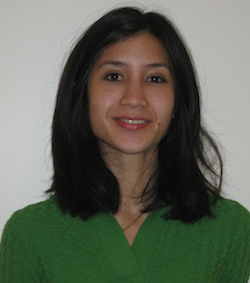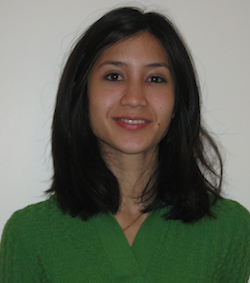Student essay on faculty mentor gains national recognition


July 2014
“Dr. Harrison has been far and away the most influential professional mentor I have ever had…. Her approachable, supportive personality not only allowed but encouraged me to stop by if I had questions, ideas, or just needed to talk. She is never too busy to meet with me, and none of our conversations ended without producing the seed of some new project.”
A well-crafted essay by Yaowaree Leavell (Class of 2015) is spotlighting the College of Medicine’s student-centered faculty. The tribute to Suzanne Harrison, associate professor in the Department of Family Medicine and Rural Health, was a finalist in the American Medical Women’s Association contest on the topic of mentorship. The best essays, including Leavell’s, were printed in AMWA’s first Linda Brodsky Memorial Journal, named after a noted activist for fair treatment of women physicians.
Leavell is a student at the Fort Pierce Regional Campus. Both she and Harrison are involved in AMWA locally as well as nationally. Both also are members of AMWA’s committee called Physicians Against the Trafficking of Humans (PATH). On the AMWA website, Leavell wrote she believes that “AMWA gives voice to the concerns of female physicians in the local and national arena through the power of amplification, that powerful shift from ‘I believe, I desire’ to “We believe, We desire.’”
MENTOR ESSAY: SUZANNE HARRISON, M.D.
By Yaowaree Leavell
AMWA’s Linda Brodsky Memorial Journal July 2014
Published by the Medical Student Press
Every story worth its salt features at least a cameo appearance by some oracle; a guide, whose light leads the way out of the treacherous darkness and onto safe ground. My journey towards a career in medicine was not fraught with nearly so much danger, but it was a winding, circuitous road and it did feature a benevolent guide: her name was Dr. Suzanne Harrison.
At the callow age of 21, I had already tried on several lifetimes of possible professional hats. I began my college career as a classical studies and oboe performance double major. I then proceeded to change my major to neurobiology, study abroad in Spain with Spanish literature aspirations, start a thesis on Cyborg theory, and spend entirely too much time building theater props for my roommates. Meanwhile I continued taking pre-med science classes at the glacial pace of one per semester, and I went ahead and took the MCAT - just in case, I told myself, just in case.
Part of this waffling behavior was due to the fact that despite an undeniable interest in medicine and the art of healing, I had yet to meet anyone in the field with whom I really connected. I worried that perhaps I did not belong in the world of medicine, that perhaps I would be isolated and unhappy, unable to connect with my colleagues and superiors - all of whom I imagined might be vastly different from me. My all-male string of entry-level science professors from remote corners of Asia and Europe performed admirably as instructors, but did nothing to allay these fears. And so I remained just outside of the door to the world of health professionals, one toe on the threshold, right up until the day of my first, last, and only medical school interview.
As soon as I walked into the door of the interview room, she greeted me with a big, lively grin of genuine interest and curiosity. She had actually read my personal statement, and was as interested in why I wanted to be a healer as she was in whether or not I was capable of it. Instead of grilling me about basic sciences or trying to intimidate me to look for signs of weakness, she launched into a very natural conversation about women’s health issues and human rights violations. She had about her person an undeniable aura of authority which belied her relatively sparse office; in place of the usual preponderance of titles and degrees, its walls were populated with evidence of an active life led as a part of our little local community in Tallahassee, and as a part of a larger global one. Through her animated speech she painted a bright picture of all that could be made possible through the work as a physician. The scope of her vision filled me with excitement; for the first time I saw with certainty the glowing intersection between medicine and my other passions.
Since entering medical school, Dr. Harrison has been far and away the most influential professional mentor I have ever had. Connecting with adults has never been a strong point of mine; my Thai upbringing holds that it is rude to pester a figure of authority with unnecessary questions and comments unless they are expressly solicited. Her approachable, supportive personality not only allowed but encouraged me to stop by if I had questions, ideas, or just needed to talk. She is never too busy to meet with me and none of our conversations ended without producing the seed of some new project. Without her, the AMWA branch at FSU COM would not be the hive of activity it is, and I certainly never would have discovered it on my own. She has mastered the art of leading without suffocating; she suggests ideas and gives advice at times, but first and foremost she encourages us to take the reins and really own our branch. Wherever possible she offers all of us opportunities to jump on board with developing projects such as the Human Trafficking Taskforce she urged us to join last year.
After that initial interview, I went on to defer medical school for two years after acceptance to join Teach for America Newark 2009 Corps. Before I left, Dr. Harrison sent me a postcard in the mail which said simply “Enjoy your experience, and grow!” It is this genuine desire she has for the new generation of female physicians to spread their wings and be everything they dream possible that touched me in my time of indecision - that showed me that the seemingly cold, sterile world of western medicine has a vast underground community of warmth, and human passion - that reassured me that I could belong here among like-minded peers and superiors.
Here is a link to the Linda Brodsky Memorial Journal’s table of contents.

